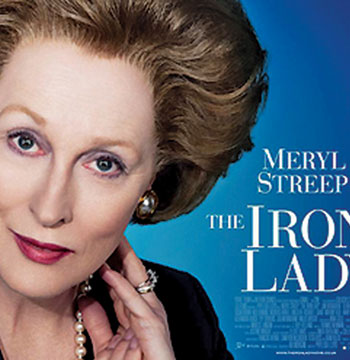|
Softening the metal: Phyllida Lloyd's
The Iron Lady
By Dr. Bindy Kampmark
Gore Vidal claimed that the second unfortunate thing to befall
Abraham Lincoln was not merely his assassination but falling into the
hands of biographer Carl Sandburg. With such hideous hagiography, the
actual historical figure shrinks just as his myth is being inflated.
 Actuality, however difficult it is to pinpoint, is simply chucked.
Something of a similar remark might be made about the Phyllida Lloyd's
The Iron Lady, which provides viewers with a sometimes baffling portrait
of Britain's polarizing and formidable prime minister. Actuality, however difficult it is to pinpoint, is simply chucked.
Something of a similar remark might be made about the Phyllida Lloyd's
The Iron Lady, which provides viewers with a sometimes baffling portrait
of Britain's polarizing and formidable prime minister.
The technique of using Thatcher, portrayed by Meryl Streep, as a
figure suffering from hallucinations and an onset of sheer dottiness is
not particularly useful in conveying the figure at all.
It is not that such figures can't have frailties, but that such
frailties are not necessarily important to the legacy they leave. This
performance, as Xan Brooks rightly points out in the Guardian (Nov 11,
2011) is Thatcher without Thatcherism. One can't even venture to say
that this is Thatcherism-lite. Human costs are minimized - no sign of
'Attila the Hen' in action or 'Thatcher the milk snatcher' conducting
her evil ministry. Historical characters are shaded into insignificance
- they might as well be mere figments of the imagination.
Instead, one is left with a true simulation of Thatcher, a trimmed
version, a humanised version. Indeed, that was Lloyd's intention,
herself being an acclaimed stage and opera director. The film, she
argues, is 'about loss', a 'sort of King Lear story about a mighty
leader who rises to power, against all the odds, who holds the line when
others are losing their faith, who becomes a global superstar, and then
- either through their own hubris, or, as they see it, the treachery of
everyone around them - crashes to an ignominious end' (Guardian, Jan 5).
In fact, when it comes to detailing any coherent chronology, let
alone narrative of Thatcher's achievements, both foul and fair, one is
left with a study of old age and geriatric loneliness. In terms of
history, a the New York Times film critic A.O. Scott observed (NYT, Dec
29, 2011), the display is much like the rambling of Billy Joel's 'We
Didn't Start the Fire' (Miner's strike/Falklands War/I can't take it any
more...) Some go so far as to wonder whether the film actually sounds a
feminist note.
Natasha Walter's reaction was one of caution but praise, with
Thatcher being 'a towering rebuke to those who believe that women are
unsuited to the pursuit and enjoyment of power' (Guardian, Jan 5).
Suggestions of the 'good' and the 'wicked' are imprecise terms in
politics.
The flashbacks, which can in some contexts serve as a useful means of
illustrating events and development of character, are irritating and
stunting. Jim Broadbent, while amusing in his role as Denis Thatcher,
comes across as the loving husband who accumulates, as time goes by, his
own cupboard of eccentricities.
He is also spectral, the ghost who permanently inhabits the set,
until he is told to depart. This is Thatcher with feeling, the fragile
Thatcher. Poignancy is layered and thick.
In the end, the message of the film goes against the very statements
Thatcher herself makes through it. It is a tribute to 'feeling', a
display of sentimentality that she would herself have found tedious.
'What we think is what we become. And I think I am fine.'
A portrayal of Thatcher juggling and jostling with the turbulent
ideas she implemented would have been not merely appropriate, but just.
Not to be fussy, but a little more on the merits (or demerits) of
privatisation, the unfettering of the market place, the proposed
infliction of the poll tax, the Cold War stance, would have done much
for the dramatic effect. The repercussions of her era remain with us as
occasional seismic jolts in the fields of politics and economics.
Binoy Kampmark was a Commonwealth Scholar at Selwyn College,
Cambridge. He lectures at RMIT University, Melbourne. Email:
[email protected] |

